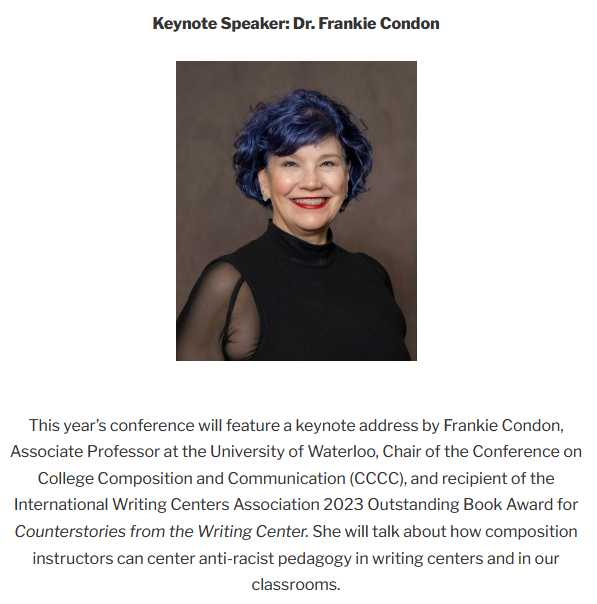Feb. 8-9, 2025
Contact email: Angela Brown at walther@ufl.edu
UWP Pedagogy, Practice, and Philosophy 2025 – “Writing at the Center”
 Writing centers—and composition pedagogy more broadly—must be outward facing, reaching across disciplines and institutional boundaries to facilitate learning. The University of Florida’s Writing Program invites proposals for our annual Conference on Pedagogy, Practice, and Philosophy. This year, we will examine “Writing at the Center” or how we center writing in our classrooms, pedagogy, and institutions for our students. In our classrooms, we must work to help students center writing in their own professional and academic lives, which can be a challenging yet worthwhile endeavor, especially with the advent of new technology. This two-day conference is designed as a practicum for writing instructors to exchange ideas and learn from one another in a collaborative spirit. We particularly encourage graduate students to apply, as well as writing center personnel, Postdocs, and junior faculty.
Writing centers—and composition pedagogy more broadly—must be outward facing, reaching across disciplines and institutional boundaries to facilitate learning. The University of Florida’s Writing Program invites proposals for our annual Conference on Pedagogy, Practice, and Philosophy. This year, we will examine “Writing at the Center” or how we center writing in our classrooms, pedagogy, and institutions for our students. In our classrooms, we must work to help students center writing in their own professional and academic lives, which can be a challenging yet worthwhile endeavor, especially with the advent of new technology. This two-day conference is designed as a practicum for writing instructors to exchange ideas and learn from one another in a collaborative spirit. We particularly encourage graduate students to apply, as well as writing center personnel, Postdocs, and junior faculty.
Centering writing means examining principles and practices we hope to share with our students and the broader university and local community. To this end, we seek submissions that explore the strategies and outcomes of how you center writing: how do you support a diverse set of students to integrate writing as a central component of their professional and academic development? What strategies have you found effective in encouraging students to view writing as a crucial skill for their personal and professional growth? In what ways can writing centers bridge the gap between different academic departments and enhance interdisciplinary collaboration? How can we balance the need for writing instruction with other academic priorities in our curricula? What collaborative efforts among instructors, students, writing centers, etc. have you participated in? What challenges our collaborative efforts?
Conference participants are asked to reflect upon the study, practice, and philosophy of teaching writing in universities and to reconsider current educational trends about learning, engagement, comprehension, and skills-development. In addition, we ask scholars to reflect on writing methods and environments that occur outside of classrooms and to discuss how diverse modes of writing influence classroom learning. Finally, the goal of this conference is to create a network for sharing effective, inclusive, innovative, and creative approaches to composition pedagogy.
Conference Format
This conference will be held in-person, but remote sessions will be made available for participants outside of Gainesville, FL. Our goals are to extend conversation across sessions and to encourage the active exchange of ideas. While traditional conference papers are accepted, we invite proposals for presentations or demonstrations that illustrate pragmatic approaches, strategies, and techniques for teaching writing.
Thus, we invite four kinds of proposals:
- Activity swap: comprising a discussion or demonstration of one activity, lesson, or technique related to risk-taking in the composition classroom. Each participant will have 10-15 minutes to demonstrate their activity, followed by group discussion and feedback.
- Themed roundtables: featuring 3 to 4 speakers discussing a specific idea or topic related to the conference. Participants’ talks will be 10-15 minutes each to allow for audience discussion. Roundtables should adopt a conversational, collaborative, and audience-centered or participatory format.
- Pedagogy Workshops: offering practical, pedagogical advice for course design and assignment creation. 3 to 4 participants will have 10-15 minutes each to lead a workshop on designing a course or assignments related to the conference theme.
- Research Paper: delivering a conference-length paper. Each participant will have 10-15 minutes to read the researched paper.
Proposal topics can include (but are not limited to):
- Specific writing activities or lessons
- Facilitating or serving in Writing Centers
- Issues in online and virtual learning
- Experiential and project-based learning
- Issues of access or inequality in writing instruction
- Inclusive pedagogy
- Writing situations, networks, assemblages
- Community literacies
- Multilingual education and language diversity
- Disability studies and composition
- Collaborative learning and peer teaching and assessment
- The use of new media and technologies in writing instruction
- Online teaching resources and pedagogy forums
- Sustainable approaches to teaching writing
- Exploring race, class, gender, and/or sexuality in the writing classroom
- Current-traditional rhetoric, expressivism, and epistemic pedagogy models
- Writing in and across the disciplines
Submissions
To submit a proposal, email a 250-word abstract with your contact information, affiliation, and position/title to Angela Brown at walther@ufl.edu. Please indicate which kind of proposal you are submitting. When proposing a roundtable or workshop, please include the relevant information for each participant.
Proposals must be submitted no later than November 30, 2024. Accepted participants will be notified by December 11, 2024. The conference will occur on February 8-9, 2025, hosted by the University of Florida.
For more information about UF’s Writing Program, visit: https://writing.ufl.edu/
Please feel free to email Angela Brown at walther@ufl.edu if you have any questions.